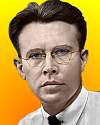
On 27 Aug 1901, when Ernest Lawrence died (too soon, at age 57), he left a scientific world much different than the one in which he began. He changed it. He was certainly one of the greatest of America's early 20th century physicists. His name is on a U.S. National Laboratory to memorialize his achievements in the building of the first atom-smashers. [BOOK INFO] who reveals more than you probably knew before about this many-sided genius. His important discoveries included creating technetium, the first artifically produced element. But he also pursued practical applications for the atom-smashers, too, such as making radioactive phosphorus and other isotopes for medical use, including radioactive iodine for the first medical treatment of hyperthyroid conditions. Further, he was the first to use neutron beams in treating cancer. In other fields, he invented the first atomic clock. But his greatest work was the development of the particle accelrators, for which he received the Nobel Prize in Physics. Definitely a scientist worth knowing more about.
It is available from Amazon, typically about (As of earlier time of writing - subject to change.)
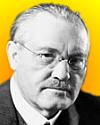 | The disaster was caused neither by carelessness nor human failure. Unknown natural factors that we are still unable to explain today have made a mockery of all our efforts. The very substance intended to provide food and life to millions of our countrymen and which we have produced and supplied for years has suddenly become a cruel enemy for reasons we are as yet unable to fathom. It has reduced our site to rubble. From the memorial service for the hundreds of people killed by the explosion of the ammonia fertilizer factory at Oppau, Germany. At the time, the explosive nature of ammonium nitrate was not understood. |
 | The day when the scientist, no matter how devoted, may make significant progress alone and without material help is past. This fact is most self-evident in our work. Instead of an attic with a few test tubes, bits of wire and odds and ends, the attack on the atomic nucleus has required the development and construction of great instruments on an engineering scale. |
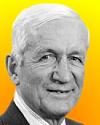 | Although I am primarily an experimental physicist, theoretical physics is my hobby. |
| Before you look at today's web page, see if you can answer some of these questions about the events that happened on this day. Some of the names are very familiar. Others will likely stump you. Tickle your curiosity with these questions, then check your answers on today's web page. | |
| Births | |
 | Carl Bosch, born 27 Aug 1874 was a German industrial chemist who developed the Haber-Bosch process for an important high-pressure synthesis. He was awarded the 1931 Nobel Prize for Chemistry What is the product of the Haber-Bosch process? From what substances is it made? |
| Deaths | |
 | Ernest Orlando Lawrence (1901-1958) was an American physicist, winner of the 1939 Nobel Prize for Physics for his invention of the first particle accelerator to achieve high energies. What was this first high energy particle accelerator called? |
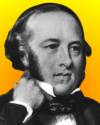 | Sir Rowland Hill (1795-1879) was an English educator and inventor who originated the modern postal service. He introduced the first adhesive postage stamp in 1840. What was the price of the first stamp? |
| Events | |
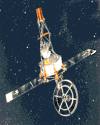 | On 27 Aug 1962, the United States launched the Mariner 2 space probe. Which planet was mission of this probe? |
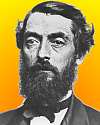 | On 27 Aug 1859, Colonel Edwin L. Drake drilled the first successful oil well in the United States. The drilling had reached 69 feet, 6 inches when a dark film floating on the water below the derrick floor was noticed. In which state was this oil well drilled? |
Fast answers for the previous newsletter for August 26: polio • Montgolfier • During the French Revolution, for his involvement with tax-collecting, he was guillotined. • Charles Lindbergh • Antony van Leeuwenhoek • Niagara Falls • Krakatoa, or Krakatau (in Indonesian).
 If you enjoy this newsletter, the website, or wish to offer encouragement or ideas, please send feedback by using your mail reader Reply button.
If you enjoy this newsletter, the website, or wish to offer encouragement or ideas, please send feedback by using your mail reader Reply button. Your click on a Facebook, StumbleUpon, or other social button on the site webpages is also a welcome sign of appreciation. Thank you for using them.
© This newsletter is copyright 2020 by todayinsci.com. Please respect the Webmaster's wishes and do not put copies online of the Newsletter — or any Today in Science History webpage. (If you already have done so, please remove them. Thank you.) Offline use in education is encouraged such as a printout on a bulletin board, or projected for classroom viewing. Online, descriptive links to our pages are welcomed, as these will provide a reader with the most recent revisions, additions and/or corrections of a webpage. For any other copyright questions, please contact the Webmaster by using your mail reader Reply button.
--
If you do not want to receive any more newsletters, Unsubscribe
To update your preferences and to unsubscribe visit this link
Executive Real Estate Business Class
-
"It was like a man with wings. It wasn't like anything you'd see on TV or in a monster movie." ...
About the publisher
Search This Blog
Blog Archive
-
▼
2021
(585)
-
▼
August
(32)
- Newsletter for Tuesday 31 August.
- Newsletter for Monday 30 August.
- Newsletter for Sunday 29 August.
- Newsletter for Saturday 28 August.
- Newsletter for Friday 27 August.
- Newsletter for Thursday 26 August.
- Newsletter for Wednesday 25 August.
- Newsletter for Tuesday 24 August.
- Newsletter for Monday 23 August.
- All-New Tonight: 'The Machines That Built America'
- Newsletter for Sunday 22 August.
- Newsletter for Saturday 21 August.
- Newsletter for Friday 20 August.
- Newsletter for Thursday 19 August.
- Newsletter for Wednesday 18 August.
- Newsletter for Tuesday 17 August.
- Newsletter for Monday 16 August.
- Newsletter for Sunday 15 August.
- Newsletter for Saturday 14 August.
- Newsletter for Friday 13 August.
- Newsletter for Wednesday 11 August.
- Newsletter for Tuesday 10 August.
- Newsletter for Monday 9 August.
- All-New Tonight 9/8c: Telephone Wars
- Newsletter for Sunday 8 August.
- Newsletter for Saturday 7 August.
- Newsletter for Friday 6 August.
- Newsletter for Thursday 5 August.
- Newsletter for Wednesday 4 August.
- Newsletter for Tuesday 3 August.
- Newsletter for Monday 2 August.
- Newsletter for Sunday 1 August.
-
▼
August
(32)
-
Blogroll
-
About
HistoryFact










0 comments:
Post a Comment